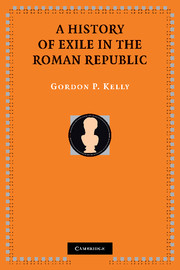Book contents
- Frontmatter
- Contents
- Preface
- 1 Introduction
- 2 Exilium: Legal and Historical Issues
- 3 The Journey into Exile: The Early Republic to the Social War
- 4 Exilium from the Social War to the Death of Julius Caesar
- 5 Topics of Exile
- 6 Prosopography of Roman Exiles
- Conclusions
- Appendix I The leges Clodiae Concerning Cicero's Exile
- Appendix II Restoration of Legendary Figures of the Early Republic
- Bibliography
- Index
Appendix I - The leges Clodiae Concerning Cicero's Exile
Published online by Cambridge University Press: 26 October 2009
- Frontmatter
- Contents
- Preface
- 1 Introduction
- 2 Exilium: Legal and Historical Issues
- 3 The Journey into Exile: The Early Republic to the Social War
- 4 Exilium from the Social War to the Death of Julius Caesar
- 5 Topics of Exile
- 6 Prosopography of Roman Exiles
- Conclusions
- Appendix I The leges Clodiae Concerning Cicero's Exile
- Appendix II Restoration of Legendary Figures of the Early Republic
- Bibliography
- Index
Summary
The laws sponsored by the tribune p. clodius connected with the exile of Cicero in 58 provide us with the most detailed account of the legislative activity associated with exilium. Although there is much evidence for these leges, the ancient sources must be used with caution. Most of the information we have regarding these acts comes from Cicero himself and is understandably biased and one-sided. Later ancient authors seem to have consulted the orator's works and thus also display his singular point of view. Cicero attempted to depict the leges Clodiae concerning his banishment as illegal and technically flawed. His speeches post reditum particularly stress that he was forced from Rome due to Clodius' unconstitutional legislation and violent gangs. In short, Cicero strove to illustrate that his downfall did not occur in the course of standard judicial procedure. For example, there were two Clodian laws that contributed to Cicero's eighteen-month exile from Rome, but Cicero in his public speeches telescoped these two measures into one and distorted events to make his opponent's legislation appear irregular. Cicero's argument that he had been the victim of a privilegium by Clodius partially relied on this bit of sophistry.
Indeed, Cicero's exile was not as unusual as the orator would have us believe and was largely accomplished in accordance with long-standing legal precedents. An initial Clodian law established that the execution of a Roman citizen without trial was a capital offense.
- Type
- Chapter
- Information
- A History of Exile in the Roman Republic , pp. 225 - 238Publisher: Cambridge University PressPrint publication year: 2006



